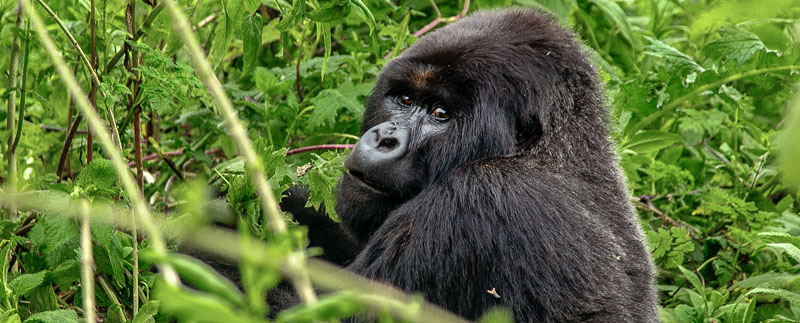Tag: WTM
Everyone needs nature, but nature needs us too

Perhaps like me you have spent this month hellbent on listening to, and consuming all that WTM Virtual had to offer in the way of reassurances, advice, and inspiration for future travel and tourism?
…
Unusually for WTM to have the time to listen to the presentations, as well as to take part, has been hugely welcomed. A rare opportunity to hear the sentiments of others, to learn, to connect, and importantly, to think.
“Tourism can be a force for good”, certainly resonates, as well as the urgent call by Ministers “to create a safer, greener and smarter travel and tourism”. I certainly support such sentiments, particular in relation to animal protection and biodiversity regeneration, but whilst an important call to action, there remains difficulty for business to decipher viable actions from such a vision. This is a recurring challenge for travel businesses that want better to protect animals and the natural environment – and why the ANIMONDIAL consultancy was established.
The 2020 Living Planet Index (LPI) presented a stark picture:
- Between 1970 and 2016, there has been an average 68% decline in monitored populations of mammals, birds, amphibians, reptiles, and fish.
- One fifth of the world’s animals and plants – 32,000 species – are threatened with extinction.
- The planet’s biodiversity is in rapid decline, threatening ecosystem viability.
- This threatens our ability to access food and fresh water, medicines and materials, and our capability to combat Climate Change and future viral emergence.
Basically, since 1970, our Ecological Footprint has far exceeded Earth’s rate of regeneration.
There is really no time to waste, we need to act #ForNature.
Encouragingly, I have seen a shift in people’s sense of urgency, and support for action to better protect nature, but there is also a sense of disconnect too that must be addressed.
Perhaps it is so huge an issue that many people feel that action is best left to governments, or it’s the responsibility of big business, or that ending the Covid-19 pandemic has greater importance. These mindsets were considered in the ‘Tourism and Biodiversity, Friend or Foe’ discussion (available at WTM Virtual), which acknowledged the role of business to engage and invest in nature.
The discussion between responsible tourism professionals and conservationists also recognised that Covid-19, biodiversity-loss and the Climate Crisis are inter-related. Failure to protect and regenerate nature will ultimately increase the likelihood of greater environmental challenges, which includes further pandemics. Humanity’s wellbeing, prosperity and survival is therefore dependent on healthy, functioning ecosystems.
Nature is valued and enjoyed by everyone, we must do what we can to protect it.
As tourism businesses, we already know the importance of nature and what it uniquely brings to many destinations across the world. We know travellers are increasingly wanting to include nature in their holidays and ensure measures are taken to minimise negative impact. Tourism can also generate value in nature, influence the protection of key species (such as the Bengal tiger or mountain gorilla) and with tourism revenues, encourage local and national governments to better protect wild spaces and ecosystems.
Tourism, and the thousands of SMEs that underpin the industry, could therefore play a significant role in leading the charge on nature protection and regeneration by:
- Offering greater nature-based tourism product;
- Investing in local communities;
- Working with your suppliers to deliver sustainable activities and solutions;
- Supporting genuine community-based conservation;
- Ensuring only sustainable and responsible activities with animals;
These are obvious and easy steps in the right direction. Although we could do more.
Defining what to do, and how to make a meaningful difference is, however, a complex task. This was a reflection as I completed ANIMONDIAL’s submission to the Business for Nature consultation on the Post-2020 Global Biodiversity Framework. ANIMONDIAL has joined over 600 businesses to urge the world’s governments to set ambitious goals, targets, and policy directions in the lead-up to COP15 on the Convention of Biological Diversity (May 2021). Mobilising multi-sectorial businesses to influence governments to better protect biodiversity is certainly commendable, but it also occurred to me that businesses, particularly in tourism, could further step-up and play a key role. Particularly if those ambiguous visions were translated into relatable and viable actions to optimise output. Whereby overall recommendations to review, reduce and protect are specifically defined for airlines, accommodation-providers and tour operators, for instance. Whilst the SDGs provide important guidance, I would recommend the recruitment of sector and sub-sector champions to help the different businesses optimise on their output.
What is clear is that all businesses, and functions within, irrespective of the sector, must:
- Review their current activities against the SDGs and performance criteria;
- Measure and minimise negative impact;
- Act to better protect and restore nature and its biodiversity.
Check out ANIMONDIAL’s Build Back Better for Animals, supporting the tourism sector.
The other consideration to ponder is should there be ‘a stick’ to encourage those businesses that choose to ignore the urgency, or worse still, proliferate its demise? Justin Francis, WTM panellist and long-term pioneer of responsible tourism, certainly thinks so, he advocates a legal requirement for businesses to ensure biodiversity net gain and penalties for those that do not.
Ultimately everyone needs nature, but nature needs us too.
» Find out more about ANIMONDIAL’s Build Back Better for Animals initiative
» Sign up to ANIMONDIAL’s newsletter for the latest on animal protection news

Working together to overcome perceived divides

On attending the Elephant Wellbeing and Thai Community event, hosted by the Tourism Authority of Thailand (TAT) at WTM London (November), it occurred to me how important it is to consider an issue from its cultural perspective. Noting that perceived cultural divides between traditional practices, ‘foreign’ opposing views and industry standards can been a significant obstacle when seeking meaningful change.
Take elephants in tourism as an example. This is a hotly debated issue with a range of impassioned views on how elephants should be involved in tourism. Many are based on emotive sentiment, animal welfare science or sustainability ideals, none of which I condemn, but I do feel that more could be achieved, and opportunities realised if thought was given to the local culture, livelihoods and economic relevance. Listening to the owners of the Asian elephant attractions attending the TAT event, it was evident that they feel threatened and confused by the various standards imposed on them by foreign entities. I can understand that point of view, particularly when those ideals rarely consider the status quo or consult such attractions.
As I have come to realise as a Director for ANIMONDIAL, it is of vital importance to engage all stakeholders, understand the many points of view and if you can, see the activity and resulting implications for yourself. Only then can a complete picture be formed, and if required, viable solutions be identified. At ANIMONDIAL, this approach gives us the ability to provide our clients with complete and accurate information that aids their informed decision-making.
By example, during my recent investigations into the trade in dog and cat meat in SE Asia, it has been important to engage with the local communities to understand their motivations for the trade. This has helped to formulate an awareness-raising campaign as a viable option, both regionally and internationally, by focusing on the associated animal cruelty and public health concerns. Incorporating constructive engagement with the authorities, animal rescue and alternative livelihood options. This will likely be the approach taken by our clients, Four Paws International, during their awareness-raising campaign in 2020.
Perceived cultural divides between nations and geographical regions should never been considered an obstacle or a challenge but instead a need to engage, understand and find common ground. From experience, taking this time is likely to deliver opportunity. Particularly, when the realisation is that there are often common goals between stakeholders that then help to deliver tangible solutions to those recurring challenges.
The TAT’s Elephant Wellbeing & Thai Community discussion concluded that there is a need for a collaborative approach, whereby stakeholders need to work together, and be willing to compromise their position, in order to deliver meaningful change. In my humble opinion, this approach should be tried and tested in all eventualities where cultural divides are perceived. Otherwise the recurring challenges for the travel industry in relation to animal involvement in tourism (as well as with other issues) are unlikely to be resolved.
If you would like to find out more about ANIMONDIAL’s collaborative work to improve the welfare of captive Asian elephants or address the associated risks of the dog and cat meat trade, please contact us or, if you haven’t already, sign up to our monthly newsletter.

